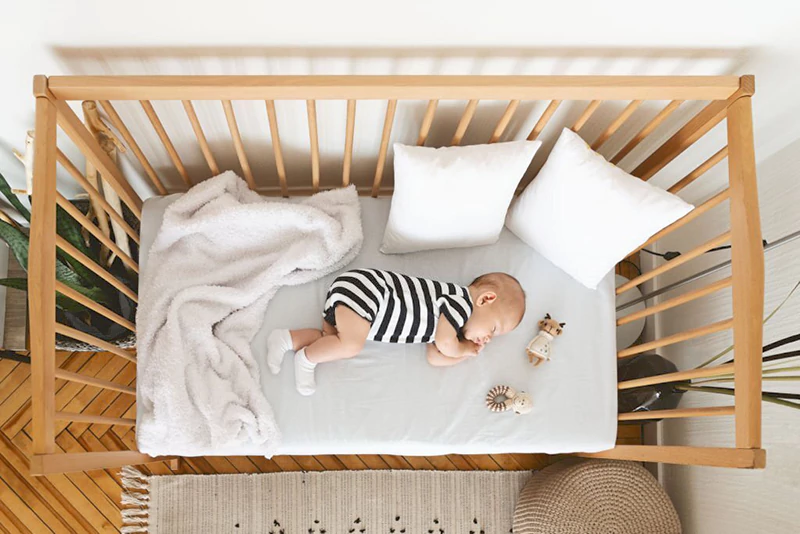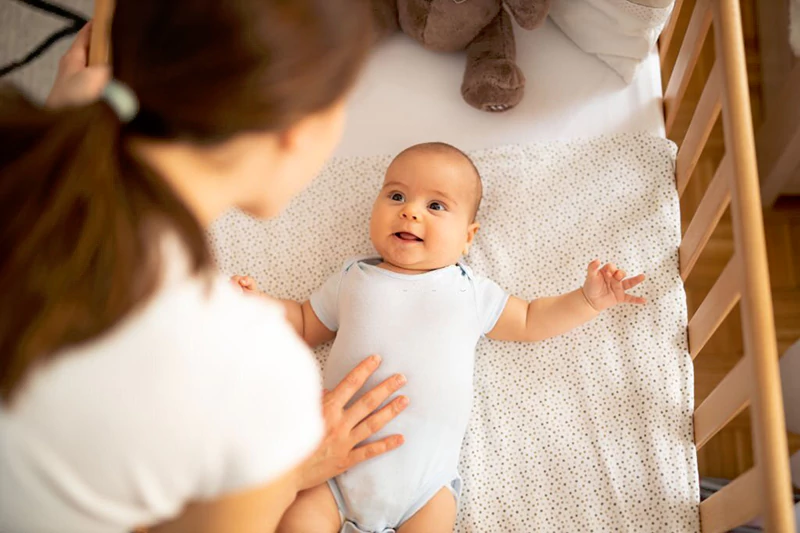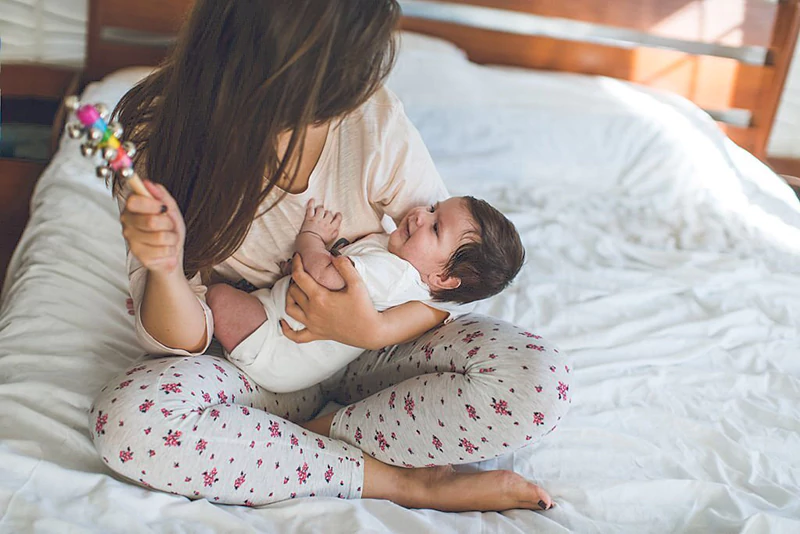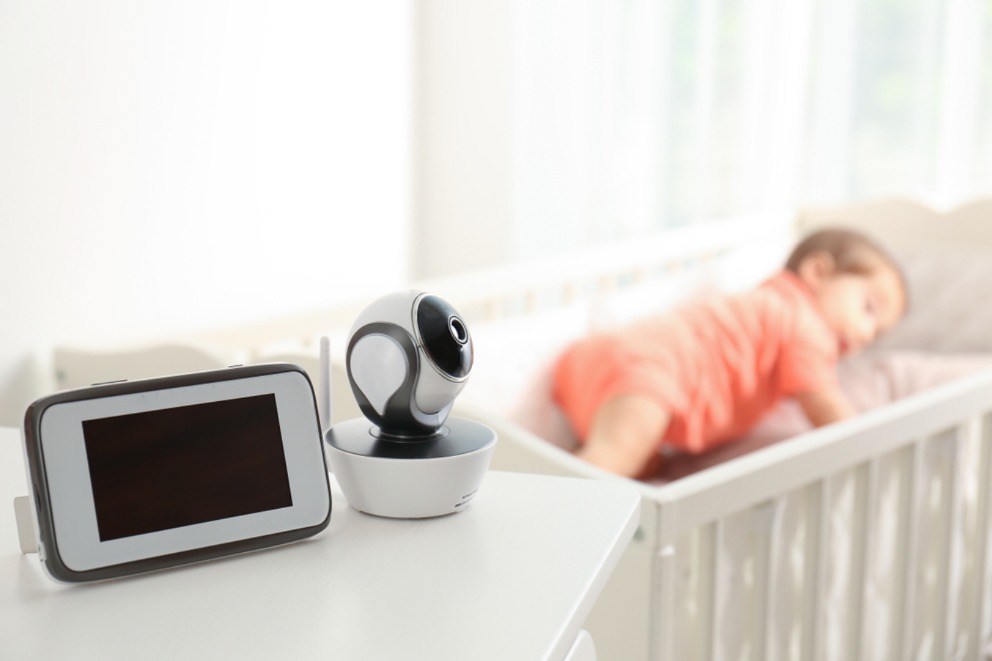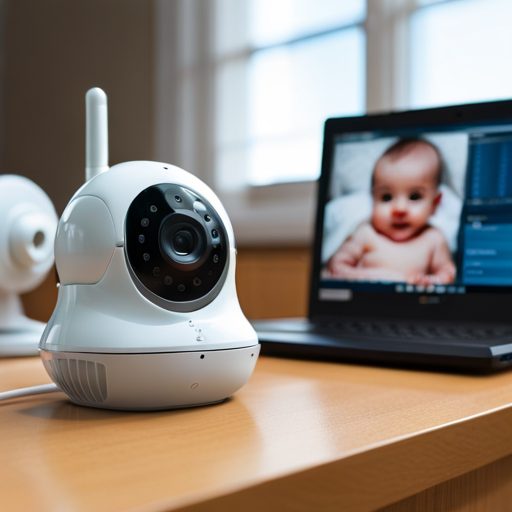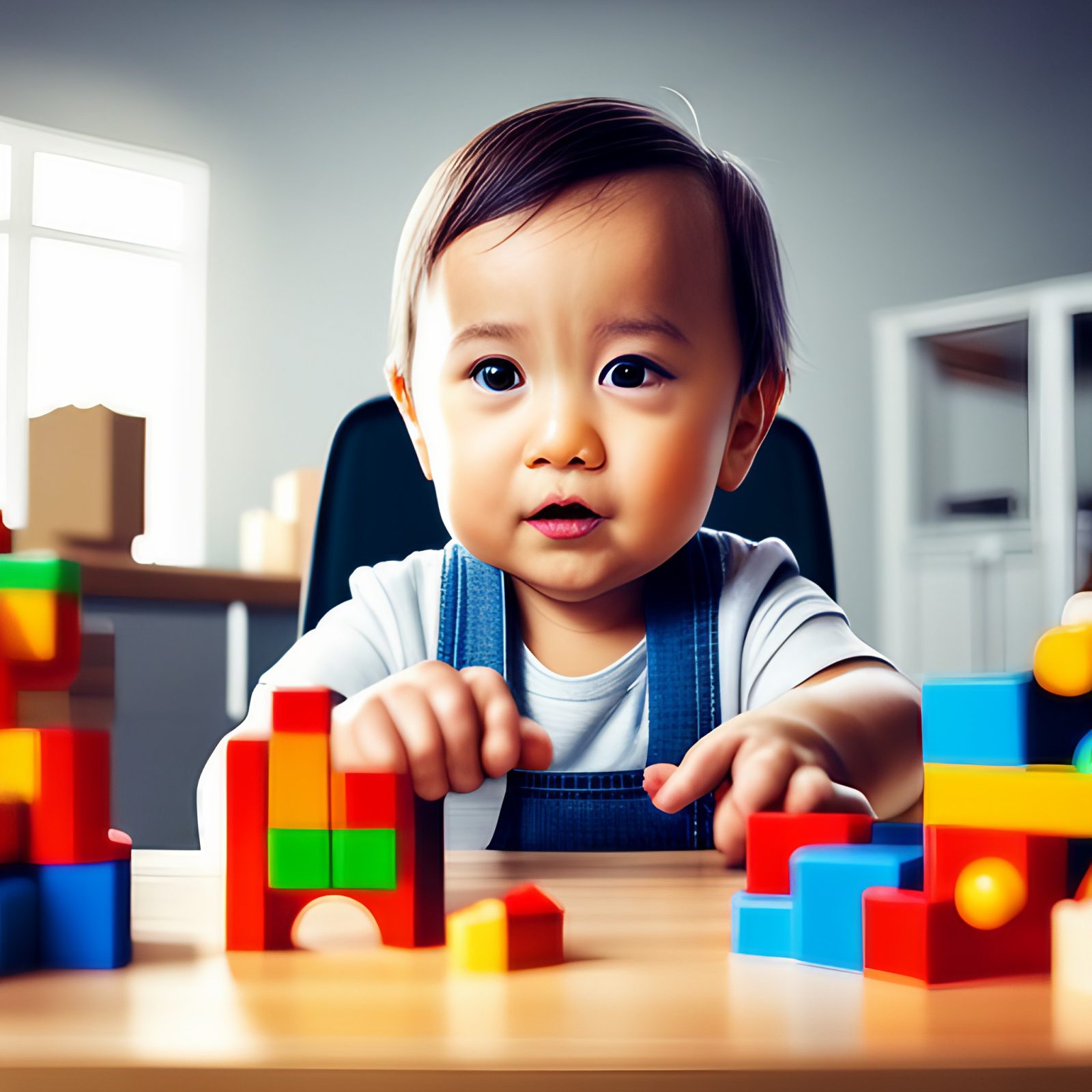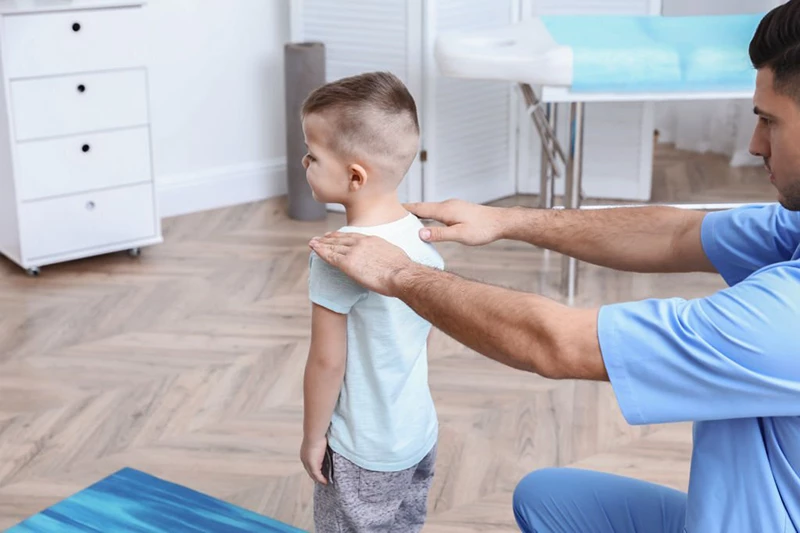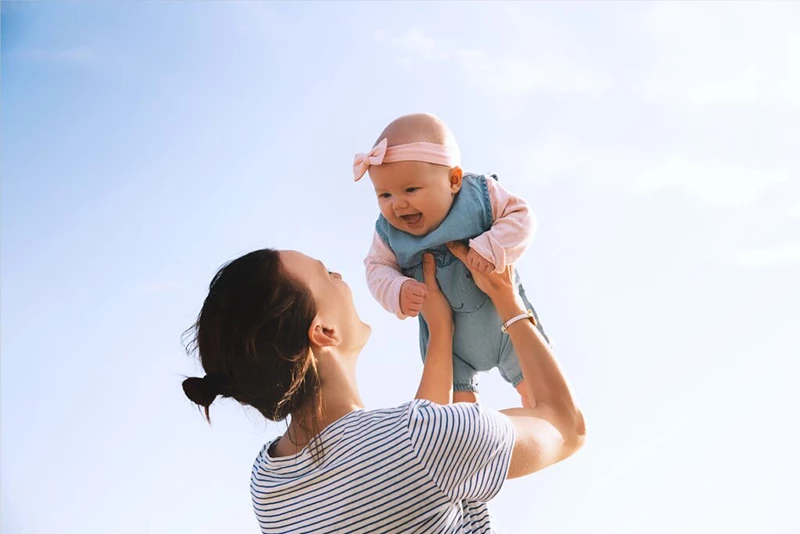Imagine this nightmare scenario – your precious baby is rolling in his or her crib and in the process, manages to hit their head on the hard bars of the crib. Ouch!
What do you do when your baby rolls all over the crib and hits their head on the side?
Do you panic?
Are you worried they might be injured?
While it’s always a good idea to keep an eye on your little one, you can rest assured that a baby rolling in crib hitting head is generally not cause for concern. In this blog post, we’ll take a look at what causes babies to roll around in their cribs and what you can do to help them stay safe. Plus, we’ll dispel some of the myths about baby rolling in crib hitting head so that you can relax and enjoy this exciting new stage in your child’s life!
Baby Rolling in Crib Hitting Head is A Form of Head Banging
Baby rolling in crib hitting head is one of the common forms of head banging. So, to understand the reason behind Baby rolling in crib hitting head, it is crucial to understand the head banging in the first place.
What Is Head Banging:
Head banging is fairly common in babies, and it’s thought to affect around 20% of healthy infants and toddlers. Head banging is a repetitive movement that babies make with their heads, usually against a hard surface in a rhythmic manner.
When Does Head Banging Start in Children:
Head bangers often start to bang their heads in the second half of first year, around 6-9 months of age.
How long does head banging last:
The head banging habit may go on for several months or even years. Between the age of 1.5-2 years, this habit reaches its peak. Kids usually grow out of this behaviour by the age of three.If your child’s head banging continues for more than three years, you should have them checked by a professional.
Read More: Baby Flailing Arms And Legs While Sleeping – How to deal with it?
What Are Signs of Head Banging?
As we discussed earlier, a Baby rolling in crib hitting head is one of the common forms of head banging. The Other Head banging forms, according to JOURNAL ARTICLE by Vladimir de Lissovoy from Pennsylvania State University, are in below-
-
Hands and knee position:
Child stands on hand and knee, rocking back and forth rhythmically and banging the forehead or cranial cap against the crib headboard.
-
Sitting Position:
Banging the back of the head against a hard surface when sitting upright.
-
Prone Position:
Striking the Head down with force against the mattress when lying face down.
-
Supine Position:
Baby rolling in crib hitting head.
Why Does Head Banging Happen in Babies and Infants?
It’s puzzling, head banging. It’s one of the first things that strike parents as strange about their baby or infant. Why do they do it? What is the motivation behind this seemingly odd behaviour?
While it usually doesn’t indicate anything serious, there are a number of reasons why your child might start doing it. In this section of the article, we’ll discuss the most common causes of head banging-
Self-ComforT
When your toddler bangs her head, it is often because she wants to relax. The repetitive motion helps make them feel at ease and will sometimes doze off while doing this! Also doing so as they wake up in the middle of night-time! developmental experts believe that rocking back and forth may allow your little one some self-soothing time, making him more relaxed overall.
Pain Relief
Kids sometimes bang their heads if they are in pain, such as from teething or an ear infection. The act of head banging seems to help kids forget about the discomfort nearby and provides them with some relief by distracting themselves.
Frustration
When toddlers are unable to communicate their emotions, they might use a physical expression like head banging. This is one way that children express themselves when things get too stressful for them, and it can be seen as an attempt at self-soothing.
Attention-Seeking Behavior
Toddlers are naturally inclined to get attention, which they may do through destructive behaviour. So if you see your toddler doing something self-destructive like head banging, then this could very well be a way that will capture our sympathy and make us want to give him what he wants – Our Attention!
Underestimation
Conversely, some kids bang their heads when they’re not getting enough stimulation. They may be overly active or fidgety and need more sensory input than most children. When they don’t get it, they may start head banging as a way to try and get more stimulation.
Developmental Problem
Sometimes, head banging can be a symptom of autism or other developmental disorders. But it’s very rare. In most cases, head banging alone doesn’t signal a development issue with your child; it’s one of many behavioral red flags to watch out for.
If other symptoms such as poor social interaction, speech delays, or emotional outbursts accompany head banging, this could indicate something more serious. In such a situation, do make sure to see your paediatrician for an accurate diagnosis!
Read more: How To Stop Baby Sleeping Face Down
A way to release energy
Some toddlers may start head banging because they have a lot of energy that they don’t know how to release. This can be especially true if your child is naturally active or if he isn’t getting enough exercise.
Overstimulation
Some children bang their heads when they feel overwhelmed by all the sensory input they’re taking in. For example, loud noises, bright lights, and sudden movements can be too much for some kids, and they’ll try to cope by banging their heads.
Boredom
Toddlers are notorious for being restless when they’re bored. So if there’s nothing else to do, they might turn to head banging as a way to pass the time.
What can parents do about infant head banging
What can parents do about infant head banging? It’s a question that often plagues parents, especially when their child’s banging becomes more frequent. While there is no one-size-fits-all answer, this blog post section will provide some helpful tips and advice on how to deal with an infant’s head banging. Use these strategies to help minimize your child’s behavior and keep them safe and healthy. Thanks for reading!
Read More: 10 Tips on How To Keep Baby Warm In Car Seat
Give your toddler your attention:
Make sure you give your toddler positive attention, but not when they are head bangin’. If it seems like they’re doing this because of an obsession with getting your focus off them, then try not to make anything out of it;
Try not to react overly strongly- such reactions could reinforce the behavior and make them more likely to continue doing it.
However, it is important that you do not yell at or harshly scold your toddler. They are too young to understand the situation.
A better idea would be to ignore these behaviors and maybe eventually move on from there!
Protect your child from injury:
Your toddler may be a little wild in his crib, but don’t worry!
Monthly checks for loose screws and bolts can make all the difference in whether your toddler’s crib is safe or unsafe.
Make sure you check each screw and bolt of the crib every month because they can loosen over time.
The rubber casters to the crib legs can be very handy to reduce noise as well as wear and tear on the floor. Hanging a soft fabric or quilts in between your baby’s crib and the wall will also help reduce noise and save your wall from damage. Don’t put pillows in his room; they could pose choking or suffocation hazards if he starts rolling over while sleeping!
Incorporate rhythm in other ways:
Why is head-banging so fun? It’s because of the rhythm.
When children bang their heads, it is often because they enjoy the rhythm. So just offer them some alternate rhythms like music, dancing, or drumming so that they kinda forget about the head banging rhythm.
Have you considered a metronome for your child’s room? This will give him the comfort of a steady rhythm.
You can even have fun with them and create different activities for an added bonus!
And don’t forget about facilitating them with plenty of exercises throughout the course. Exercise will help them burn off some of the nervous energy which might trigger their head banging phenomenon.
Create a soothing bedtime routine:
When your child has had a busy day, he might bang his head to try and come down from the high that comes with being active.
To help your toddler relax before bedtime, set up a consistent and relaxing routine.
A warm bath, calm rock on the lap with some quiet story or song can do wonders!
It’s not unusual for parents to stroke their kids’ foreheads or rub their backs before bedtime; these things have a very relaxing effect on children.
But what about soft music in the bedroom? That can be very soothing and may keep your little one relaxed all night long!
Try not to worry:
And your little one might have a few bruises, but don’t worry.
head bangers are usually eager to self-regulate their own pain, meaning they know their own pain threshold.
So if it gets too intense, they’ll either stop or soften the force.
Talk to other parents:
If you’re struggling to find a solution, talk to other parents. They might have some ideas that will help you.
Network with other parents and swap tips! You never know what kind of advice they might have!
Distract them with other activities:
If your child is banging their head because they’re bored, you might be able to distract them with other fun activities.
One way to do this is to provide lots of exciting toys and activities that will capture their attention.
You can also try taking them outside for a walk or to the park so they can run around and get some energy out.
And don’t forget about spending time with them! Quality time together can help keep your toddler from getting bored and looking for something to do on their own.
Be positive:
Remember to be positive, even when things are tough.
Your child is counting on you to be their biggest supporter, so make sure you stay positive and upbeat.
Enjoy your child:
Most importantly, enjoy your child. They grow up so fast, and before you know it, they’ll be adults.
Take the time to laugh with them, play with them, and just enjoy their company. It’s the best thing you can do as a parent.
Limit exposure to triggering factors:
If you can, try to limit your child’s exposure to factors that might trigger head banging. This could include things like loud noises or busy environments.
If possible, try to create a calm and relaxing environment for your child at home and when out and about. This will help them feel more in control and less likely to bang their head.
Provide safe outlets for energy:
Toddlers are naturally energetic, and they may head-bang as a way to release some of that energy.
One way to help your child release energy is to provide safe outlets for it, such as plenty of time outside in the fresh air, a room to play in that is stocked with safe toys, and plenty of opportunities for exercise.
Remember that it’s normal:
It’s important to remember that head banging is normal behavior for some toddlers. Most children outgrow it by the time they are three years old, and there is usually no need for concern.
If your child is head banging, try not to worry and remember that it will most likely go away on its own.
Stay calm:
When you see your child banging his head, it can be difficult not to react with worry. However, reacting with worry will only make things worse.
Try to stay calm and positive, even if you are feeling panicked on the inside.
This will help your child feel more comfortable and relaxed.
Should You Use Crib Bumper to minimize the impact of Baby rolling in crib hitting head?
Sometimes parents think of using a crib bumper to minimize the impact of Baby rolling in crib hitting head. But this is not recommended, as it has been linked to increased risk of SIDS.
The U.S. Consumer Product Safety Commission (CPSC) urges parents to stop using crib bumpers because of the risk of suffocation and strangulation.
Now we have discussed earlier that head banging is a very much self-regulating behavior. It is highly unlikely that your kids will hit their heads in a manner that causes serious injury. If it hurts them too much to continue head bangs, then the knocking will likely slow down or soften on its own.
Now, introducing a crib bumper to minimize the impact of head banging will not be the smartest decision. You might think that this would reduce the risks of serious injury, but it could potentially create different complications.
So, if you are looking for a way to prevent your baby from banging their head in their crib- don’t use a crib bumper! There are plenty of other ways to do this, and the risk of using a crib bumper is just not worth it.
When to See A Doctor:
At what point does head banging become a cause for concern?
You should see a doctor if your toddler constantly bangs their head during the day or continues to do so even though it is hurting themselves. Not only that; if these behaviours are accompanied by other signs like speech delays, poor social interactions or head control, then always seek out medical advice.
Conclusion
So, should you be worried if your baby rolling in crib hitting head ? The answer is maybe a little bit (after all, it’s your loved one), but probably not as much as you think.
Lack of information is often a big source of anxiety for parents, so we wanted to provide a comprehensive resource on the topic.
We looked into the underlying reason babies do this and found that it’s generally nothing to worry about. Parents can do a few things to ensure their baby is safe, so we provided a few tips. We hope you find them helpful!
If you have any questions or concerns, please let us know. We love helping parents feel confident and informed about their children’s health and development. Thanks for reading!
ATTENTION:
The information on this website is not intended to replace professional medical advice and should never be taken as such. Instead, it should only serve as a starting point for discussing the well-being of your baby. We highly recommend you discuss any concerns or questions regarding your and your family’s health or medical conditions with a doctor or a licensed healthcare provider.

